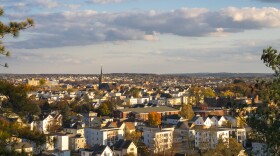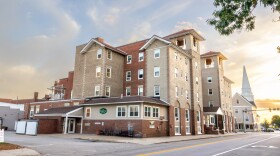Julia Neily has lived in Lebanon for the last 25 years. Recently, she tried to find a one-bedroom rental in the Upper Valley for her mom — who lives in Massachusetts — so that they could live closer to each other. But it wasn’t easy.
“Oh, my gosh, horrible,” she said. Listings were going so fast that she barely had time to send in an application. “As soon as you find a place, it was gone in a day.”

Deb Shinnlinger, who owns Lucky’s Coffee Garage in Lebanon, said the housing crunch is making it hard for businesses like hers to find and hold onto workers. One of her employees had to settle for a house 90 minutes away, in St. Johnsbury, Vermont — because it was the only place he could afford.
“Our previous coffee manager actually lived in a yurt on my property,” she said. “We have to be creative in order to retain people in the Lebanon area.”
The Upper Valley has seen rapid growth within the last decade. Lebanon’s population grew by 9% between 2010 and 2020, making it one of the fastest-growing communities in the state. The U.S. Census Bureau identified the Claremont-Lebanon region as the top “micropolitan area” in the country, noting its high concentration of businesses and employees among similarly populated regions.
Yet according to New Hampshire Housing, Grafton County, where Lebanon is located, had one of the lowest vacancy rates in the state in 2022 — just 0.3%.
New Hampshire is facing a severe, statewide housing shortage that hasn’t kept up with population growth — but it’s especially acute in economic hubs, like Lebanon and surrounding towns. The Upper Valley Lake Sunapee Regional Planning Commission says the area will need around 10,000 new homes by 2030 to keep up with current population trends. That’s three times more homes that were created in the last decade alone.
This spring, some communities are trying to chip away at the problem by updating their zoning amendments. In Lebanon and New London, local officials are proposing amendments that would make it easier to build different kinds of housing — from manufactured homes to accessory dwelling units.
Voters in each community will have the final say when they head to the polls for local elections. The officials backing these changes, like New London Planning Board Chairman Tim Paradis, said the goal is to offer more “tools in the toolbox” for dealing with the local housing crisis.
“We can't do absolutely nothing and say we want it to not change at all,” Paradis said. “Because that's just not working right now.”

One proposal on Lebanon’s ballot: a blueprint for cottage developments
In Lebanon, Mayor Tim McNamara is most excited about a proposal that authorizes building resident-owned cottage developments: clusters of no more than 16 small homes with a shared space.
“It's not something we've seen a lot of, around here, but it's worked in other parts of the country, and I think it's a real, strong option,” said McNamara, citing architect Ross Chapin’s work on cottage communities across the country.
Nate Reichart, Lebanon’s director of planning and development, said cottage communities are becoming increasingly popular in the Pacific Northwest and in California. And he thinks the model could work well in New Hampshire: The price and size of the cottages make them a more affordable option for a path to ownership. With a shared communal space built in the center of these clusters, Reichart thinks they can also encourage community building that Lebanon values.
“You can do that from a planning perspective, and from an architectural perspective,” he said. “You can bring neighbors together in a positive way just by the form of the housing that you're building.”
Either way, Reichart said, creating a diversity of housing options in Lebanon would let as many people find it affordable to live in the city.
“We have to have a continuum of housing options and choice, because we're all at different stages in our lives,” he said. “All these stages of life have [different] economic stages that come along with it.”
‘This has to be a regional solution’

Even if Lebanon’s voters greenlight all of the zoning proposals, McNamara knows they won’t be the silver bullet that the city needs to fully address the housing shortage.
With Lebanon being a central business and employment hub in the Upper Valley, McNamara said many people want to move there. And while the city has moved with some development projects, McNamara said it’s tough to keep up with the influx of new people.
“I don't see it getting a lot better at this point,” he said. “The demand is clearly outstripping the supply.”
That’s why McNamara’s also been pushing for collaboration across towns and cities in the area to build more housing.
“The surrounding towns have to have a role in this,” McNamara said. “This has got to be a regional solution, or it’s not going to work.”

Only a handful of towns in New Hampshire’s Upper Valley are taking up zoning changes this town meeting season. But farther south, in New London, town officials are also pushing for changes in an effort to address the housing shortage.
“I think we’re feeling the same pressures as the rest of the state in the housing market,” New London Zoning Administrator Adam Ricker said. “We’ve been hearing from our major institutions that they’re having a hard time recruiting because people can’t find housing — not just in New London, but anywhere in a reasonable commuting distance that’s affordable for the positions that they’re recruiting for.”
Recent census data shows that single family units make up the vast majority of New London’s housing. This spring, the town’s planners are hoping voters will be open to incentivizing different types of housing developments. That would include multi-family homes, condos, and workforce units. Another proposal would grant density bonuses — financial incentives to build units in a specified development project — in certain parts of town where planners think more housing would work well.
Paradis, who leads the town’s planning board, said that kind of mixed housing stock is exactly what the town needs: Right now, New London officials say out of the more than 2000 units in town, only 7 are available.
Building a variety of housing, Paradis said, would allow many different people to make New London a home.
“I don't think you're going to see a wholesale change,” he said. “We would just have different types of housing beyond just single family housing in certain areas where it makes sense.”
Ricker said it’s hard to tell how the proposals will go over when voters finally weigh in.
“I think that whatever the will of the voters ends up being, it will provide the planning board data,” he said. “Then, they can readjust and decide what their path forward will be.”








